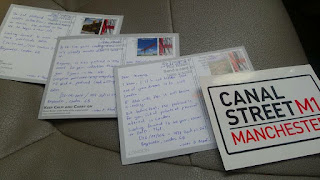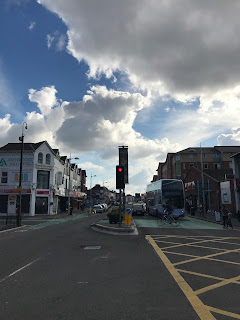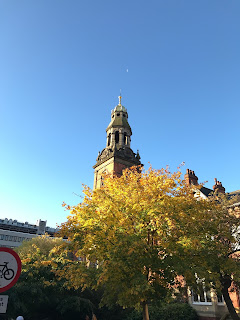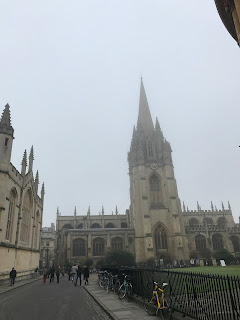Last week, I travelled out of the UK for the first time since my arrival. While we were advised to buy 250.00 € minimum for our travel expenses, I did the same. The only difference is that I loaded a sum of sterling into my Monzo debit card which had made my travel more cashless than before.
Wait, Monzo? What's that?
It is an app-based bank established in 2015 and is based in London, United Kingdom. Therefore, it does not have any physical branch unlike major high street banks. Previously known as Mondo Bank, its main product is the
prepaid contactless debit card and it works by topping it up using existing debit card or by UK bank transfer through Monzo app which can be downloaded from Play Store or App Store (note: app-based, hence not possible when using PC). As of April 2017, its banking restrictions were lifted and we should see it rolling its full current accounts, faster payments services and proper debit cards in the meantime.
Signing up is simple; you have to download the app and fill in your personal details. To be eligible, you have to be a UK resident. For initial top-up, it has to be at least £100 (you can always withdraw it later of course) and is done through existing debit card or by UK bank transfer. Once the deposit is cleared, you'll be put into their waiting list which will be around 1-2 weeks before the debit card is posted to your address. You should change the PIN and the card is then ready to use!
UK and International Usage: Monzo vs Mainstream UK Banks
No significant differences are observed when using the card in the UK as most of the ATMs (cash machines) here do not charge for debit card transactions, regardless of the card issuer. Monzo's card is also contactless (limited to £30 per day) and can be used just like other contactless cards, including
Transport for London services.
However, there are few major differences when comparing these cards in terms of non-sterling transaction charges. Monzo
did not charge anything for non-sterling transactions, but it is not the case for major banks, where the latter usually charge around 2-3% for that purpose. In addition to that, Monzo uses MasterCard exchange rate which is in most cases better than normal currency exchange shops (mark-ups of about 1%).
The Pros (as at 18 April 2017)
- Trackable previous transactions on the Monzo app
- No non-sterling transaction charges making it an option for young people who prefer to go cashless
- Transparent - exchange rate is always displayed for non-sterling transactions
- User-friendly application
- Reasonable MasterCard exchange rate
- Non-Monzo users are able to transfer funds to Monzo accounts by using monzo.me link
- Efficient customer services
The Cons (as at 18 April 2017)
- Not always possible to transfer funds back to other UK current accounts, you have to retrieve cash and transfer it straightaway
- Monzo's team is still working on some features such as current accounts and Apple Pay - it might take some time
- No online banking on PC (but understandable since it is an app-based bank)
Using the card in local currency vs GBP (card issuer's currency)
Here's a rule of thumb: when using Monzo or other cards abroad, make sure it is charged based on local currency and not card issuer's. There are two situations which I'll explain below will help you understand the previous rule better.
Situation 1: Using Monzo (UK-based card) in Malaysian ATMs (say, Maybank). Let's say you want to withdraw MYR 700 from Monzo card. Some ATMs will provide a dynamic currency conversion (DCC) where it provides its own exchange rate, for example "You may be charged in GBP, 700 MYR = 120 GBP)". The subliminal issue in the DCC is it includes hidden mark-ups by the ATM provider, making ATM's exchange rate worse than MasterCard's. So it's always better to continue without conversion and let your card be charged in Malaysian ringgit instead of pounds sterling in this case.
Situation 2: Using Maybank (Malaysian-based card) in Spain. Always prefer to be charged in Euros instead of Malaysian ringgit (MYR) to reduce losses on your part caused by DCC which I had explained above.
In conclusion:
When in the UK, choose GBP (British pounds)
In Malaysia, choose MYR (Malaysian ringgit)
In Saudi Arabia, choose SAR (Saudi riyal)
In the EU, choose EUR (Euros)
In Russia, choose RUB (Russian rubles)
Verdict
Monzo is really useful to the extent that my friends are considering signing up for the account too! Even though there are areas that need improvement, I believe Monzo as a startup can progress further in the future considering high demand from tech enthusiasts, especially young people.
Gallery
 |
| Initial sign up page |
 |
| Transaction records |
 |
| Budgeting section |
 |
 |
 |
| Non-sterling transactions |
|
|
 |
| Sterling transaction |
That being said, Monzo had played a role in changing people's spending behaviors while travelling abroad. So what change are we able to do in order to make this world better?
Adios amigos.
UPDATE 19/4/2017: The stand-alone prepaid debit card will eventually be phased out and will be replaced by current accounts after banking restrictions were lifted on April 7.
Wan Amirul Wan Shamsir
21 Rajab 1438H
18/04/2017
City of Westminster, London, GB

































